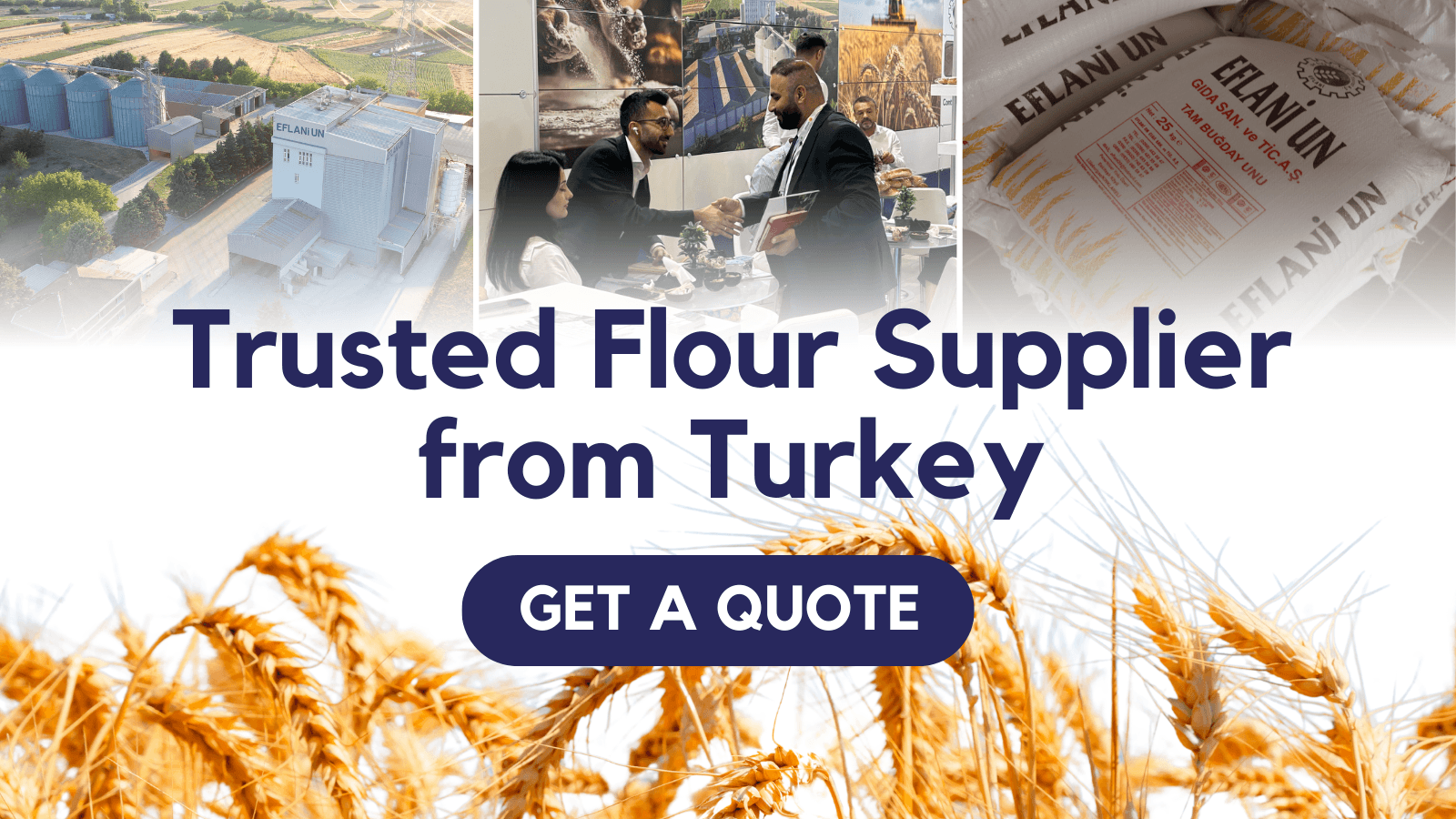Logistics and Customs Procedures for Flour Import from Turkey
A Comprehensive Guide to Efficient Logistics and Customs Clearance for Flour Imports from Turkey
Flour Imports from Turkey
Importing flour from Turkey involves a well-coordinated logistics process and a thorough understanding of customs procedures. Turkey, renowned for its high-quality flour production, is a leading exporter in the global market. This guide provides detailed insights into the logistics and customs procedures essential for successful flour importation from Turkey.
Understanding the Logistics of Flour Importation
Overview of the Logistics Process
The logistics process for importing flour includes several critical stages, from procurement to final delivery. Efficient logistics management ensures the flour reaches its destination in optimal condition and within the expected timeframe.
Importance of Efficient Logistics Management
Efficient logistics management is vital for maintaining the quality of the flour and ensuring timely delivery. It involves coordinating with reliable logistics partners, optimizing shipping routes, and adhering to best practices for packaging and storage.
Key Logistics Partners and Providers
Selecting reputable logistics partners and providers is crucial. Key players include freight forwarders, shipping companies, and customs brokers who facilitate smooth transit and customs clearance.
Selecting the Right Shipping Method
Comparison of Shipping Methods (Sea, Air, Land)
Sea Freight: Cost-effective for bulk shipments but has longer transit times.
Air Freight: Faster but more expensive, suitable for urgent or smaller shipments.
Land Transport: Ideal for neighboring countries, offering moderate costs and transit times.
Factors to Consider When Choosing a Shipping Method
Cost: Balance between cost-effectiveness and delivery speed.
Transit Time: Urgency of the shipment and shelf-life of the flour.
Volume: Size and weight of the shipment.
Packaging and Storage Requirements

Best Practices for Flour Packaging
Proper packaging is essential to protect flour from contamination and moisture. Recommended packaging includes:
25 kg and 50 kg PP bags: Durable and moisture-resistant.
Custom Packaging: For bulk orders or specific client needs.
Storage Conditions to Maintain Flour Quality
Flour should be stored in cool, dry conditions away from direct sunlight. Ideal storage environments maintain a consistent temperature and humidity level to prevent spoilage and maintain quality.
Handling and Transportation Guidelines
During transportation, ensure flour is handled carefully to avoid damage. Use pallets for stability and secure packaging to prevent tearing or spillage.
Customs Procedures and Import Duties

Steps Involved in Customs Clearance
Customs clearance involves several steps, including:
Submission of Required Documents: Ensure all documentation is accurate and complete.
Inspection: Customs authorities may inspect the shipment to verify contents.
Payment of Duties and Taxes: Calculate and pay any applicable import duties and taxes.
Necessary Documentation for Customs
Accurate and complete documentation is crucial for smooth customs clearance when importing flour from Turkey. Here are the most important details for each required document:
Commercial Invoice
Contents: Detailed list of goods, including quantity, description, unit price, total price, terms of sale, and payment terms.
Importance: Serves as the primary document for customs valuation and duty calculation.
Packing List
Contents: Breakdown of shipment contents, including type and number of packages, weight, dimensions, and any special handling instructions.
Importance: Assists customs officials in verifying the shipment contents and ensures accurate and efficient inspection.
Bill of Lading (B/L)
Contents: Document issued by the carrier, detailing the type, quantity, and destination of the goods, as well as the shipping terms.
Importance: Acts as a receipt of shipment and a document of title, and is necessary for customs clearance and claims in case of loss or damage.
4. Certificate of Origin
Contents: Certification that the goods were produced or manufactured in Turkey.
Importance: Required by customs authorities to determine the origin of the goods, which can affect tariffs and trade agreements.
5 . Health Certificate
Contents: Issued by the Ministry of Agriculture and Forestry, certifying that the flour meets health and safety standards.
Importance: Ensures that the product is safe for consumption and meets the importing country's health regulations.
Export License
Contents: Government-issued document granting permission to export goods.
Importance: Ensures compliance with Turkish export regulations and is necessary for legal exportation.
Phytosanitary Certificate
Contents: Certifies that the flour is free from pests and diseases, issued by a relevant Turkish authority.
Importance: Required for agricultural products to meet the plant health regulations of the importing country.
8. Insurance Certificate
Contents: Proof of insurance coverage for the shipment, detailing the type of coverage and the value insured.
Importance: Protects against potential risks during transit, including loss, theft, or damage.
9. Customs Declaration Form
Contents: Detailed information about the goods being exported, including value, quantity, and HS code.
Importance: Required by customs authorities for the assessment of duties and taxes and to ensure compliance with import regulations.
Import License (if required by the destination country)
Contents: License issued by the importing country’s authorities allowing the import of specific goods.
Importance: Ensures that the importer has the necessary permissions to bring the goods into the country, which may be required for certain regulated products.
Inspection Certificate
Contents: Issued by a third-party inspection company, confirming that the goods have been inspected and meet the required standards.
Importance: Often required by the buyer or importing country’s authorities to verify the quality and compliance of the goods.
Understanding Import Duties and Managing Shipping Costs and Timelines
Import duties and taxes vary by country. It’s essential to understand the specific rates and regulations of the destination market to avoid unexpected costs and delays.

Managing Shipping Costs and Timelines
Strategies for Cost-Effective Shipping
Consolidate Shipments: Combine smaller shipments to reduce costs.
Negotiate Rates: Work with logistics providers to secure favorable rates.
Optimize Routes: Choose the most efficient shipping routes to save time and money.
Timeline Management for Timely Delivery
Effective timeline management involves:
Planning Ahead: Allow sufficient time for customs clearance and potential delays.
Tracking Shipments: Use tracking tools to monitor the shipment’s progress and adjust plans as needed.
Risk Management and Contingency Planning
Effective risk management and contingency planning are crucial for securing flour importation from Turkey. Here are detailed strategies importers can employ to protect themselves from potential risks:
Risk Management Strategies
Insurance Coverage
Cargo Insurance: Secures the shipment against potential loss or damage during transit. It’s essential to choose comprehensive coverage that includes risks such as theft, accidents, and natural disasters.
Liability Insurance: Protects against legal liabilities that may arise due to shipment issues, such as damage to third-party property or injuries.
Quality Control Measures
Pre-Shipment Inspection: Conduct thorough inspections before shipping to ensure the flour meets quality standards and specifications.
Quality Certifications: Ensure the flour has all necessary certifications (ISO, HACCP, etc.) to guarantee it meets international quality standards.
Reliable Logistics Partners
Reputation and Track Record: Partner with logistics providers known for their reliability and efficiency.
Compliance with Regulations
Customs Regulations: Stay updated on the customs regulations of both the exporting and importing countries to avoid delays and legal issues.
Documentation Accuracy: Ensure all required documents are complete and accurate to facilitate smooth customs clearance.
Contingency Planning
Alternative Routes and Methods
Backup Shipping Routes: Identify and plan alternative shipping routes in case the primary route is disrupted.
Multiple Shipping Methods: Be flexible with shipping methods (sea, air, land) to adapt quickly to unforeseen circumstances.
Inventory Management
Safety Stock: Maintain a safety stock of flour to buffer against potential supply chain disruptions.
Diversified Suppliers: Work with multiple suppliers to reduce dependency on a single source.
Crisis Management Plan
Emergency Contacts: Maintain a list of emergency contacts, including logistics partners, insurance providers, and customs brokers.
Action Plan: Develop a detailed action plan outlining steps to take in various emergency scenarios, such as shipment delays, quality issues, or legal disputes.
Communication Strategy
Regular Updates: Communicate regularly with all stakeholders, including suppliers, logistics partners, and customers, to keep them informed of any issues and mitigation steps.
About Eflani Flour
Eflani Flour is a trusted name in the flour export industry, renowned for its high-quality wheat flour and reliable services. With advanced milling facilities and stringent quality control measures, Eflani Flour meets international standards and ensures customer satisfaction. Whether you need bulk orders or custom blends, Eflani Flour provides tailored solutions to meet your specific needs. Discover more about Eflani Flour and their premium products by visiting Eflani Flour's website.


